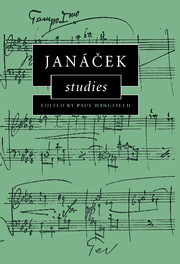Book contents
- Frontmatter
- Contents
- Preface
- 1 Expressive sources and resources in Janáček's musical language
- 2 ‘Nothing but pranks and puns’: Janáček's solo piano music
- 3 Narrative in Janáček's symphonic poems
- 4 Evasive realism: narrative construction in Dostoyevsky's and Janáček's From the House of the Dead
- 5 Direct discourse and speech melody in Janáček's operas
- 6 Kundera's eternal present and Janáček's ancient Gypsy
- 7 Janáček's folk settings and the Vixen
- 8 Janáček's operas in Australia and New Zealand: a performance history
- 9 Janáček's Moravian publishers
- 10 Janáček, musical analysis, and Debussy's ‘Jeux de vagues’
- Index
8 - Janáček's operas in Australia and New Zealand: a performance history
Published online by Cambridge University Press: 22 September 2009
- Frontmatter
- Contents
- Preface
- 1 Expressive sources and resources in Janáček's musical language
- 2 ‘Nothing but pranks and puns’: Janáček's solo piano music
- 3 Narrative in Janáček's symphonic poems
- 4 Evasive realism: narrative construction in Dostoyevsky's and Janáček's From the House of the Dead
- 5 Direct discourse and speech melody in Janáček's operas
- 6 Kundera's eternal present and Janáček's ancient Gypsy
- 7 Janáček's folk settings and the Vixen
- 8 Janáček's operas in Australia and New Zealand: a performance history
- 9 Janáček's Moravian publishers
- 10 Janáček, musical analysis, and Debussy's ‘Jeux de vagues’
- Index
Summary
Adelaide, with its well-proportioned buildings and wide expanses of parkland, is one of the most tranquil and elegant cities in Australia. By comparison with the bigger, busier centres of Sydney and Melbourne it is often considered something of a backwater, yet it has an enviable reputation for enterprise in the arts. The showpiece of the city's musical life is the Adelaide Festival. Held biennially since 1960, it has become noted for its adventurous programming and, in particular, for the presentation of important twentieth-century operas not previously seen in Australia.
The festival's major opera productions were initially given by visiting ensembles because the city had no resident professional company of its own. This situation changed when the Australian Opera, which had been a regular visitor, decided to bypass the 1974 festival in order to concentrate its resources on building up a strong summer season at the recently opened Sydney Opera House. The festival's general manager, Anthony Steel, who was a great believer in using local talent wherever possible, promptly approached the New Opera of South Australia – a small and penniless ensemble which had begun its professional existence just a few months earlier – and suggested that it should fill the gap by mounting a production of Idomeneo. The company's young administrator, Justin Macdonnell, had studied in Prague and was an enthusiastic admirer of Janáček's music. He countered by proposing The Makropulos Affair as an alternative.
- Type
- Chapter
- Information
- Janácek Studies , pp. 148 - 169Publisher: Cambridge University PressPrint publication year: 1999

